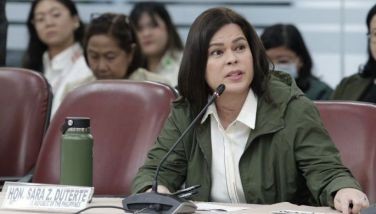Palace won't stop Larrañaga transfer
MANILA, Philippines - Malacañang said yesterday that it would not stop the transfer of convicted rapist-murderer Francisco “Paco” Larrañaga to a prison in Spain.
Deputy presidential spokesperson Lorelei Fajardo said that under current circumstances, a treaty between the two countries would have to be complied with and the transfer of Larrañaga to the Spanish penal system would most likely push through.
Fajardo reiterated that the Palace had no role in the transfer as it was an act of the
Department of Justice using the treaty as basis.
But diplomatic sources said it was President Arroyo herself , during a previous visit to Spain, who committed to transfer Larrañaga.
Fajardo said that the transfer is not yet final and the DOJ has been asked to see what else can be done in light of the sentiments of the family of Larrañaga’s victims, sisters Marijoy and Jacqueline Chiong.
“I am not saying that (it’s final). What I am saying is there is an existing treaty we need to comply with, but we have to leave it to our experts in the DOJ what else we can do about this,” Fajardo said.
“We would like to thoroughly review the provisions, to see if it’s already final and executory or if there is still some other angle that we can explore,” she added.
She also said Malacañang is open to a review of the prisoner exchange treaty between the Philippines and Spain.
Fajardo admitted that the review would entail an action by Congress so the Palace could not do anything directly to get this done.
She pointed out that a review of a treaty would have to originate from the Senate since it is this body that ratified it in the first place.
These treaties carry the force of law and as such must be respected by the signatory countries.
“There is nothing wrong if we review this. We know how the victims’ families feel but we cannot circumvent the law. There is an existing treaty,” Fajardo said.
While the Palace welcomed the review of the treaty, it also argued that such agreements have their benefits to the Philippines in particular.
Considering that there are a lot of Filipinos based overseas and in several instances, they are incarcerated for the commission of various crimes, Fajardo pointed out that these treaties could work in favor of the Philippines.
“A lot of Filipinos can also benefit from this. We have Filipino convicts in Spain whom we can ask to be repatriated here. We also have to look at that downside,” she said.
Fajardo emphasized that the case of Larrañaga went through the process of applying for the transfer both here and in Spain where he is a citizen.
“It was a long process. The convict applied for it and it was approved by Spain and it passed through a very long process. The Department of Justice and the Department of Foreign Affairs processed all the documents,” Fajardo said.
Fajardo said that the anger of the mother of the victims was understandable and that the Palace empathizes with the family.
However, she emphasized that the President and the Palace had nothing to do with the transfer as stated by Thelma Chiong.
Fajardo lamented that the President is blamed for almost everything negative that happens in the country including bad weather.
“I’d like to believe it’s emotional. I empathize with the victims’ family. But we cannot discount the fact there is still politics there but we hope there is none. That is why we keep emphasizing the Palace has no hand in this,” she said.
- Latest
- Trending





























